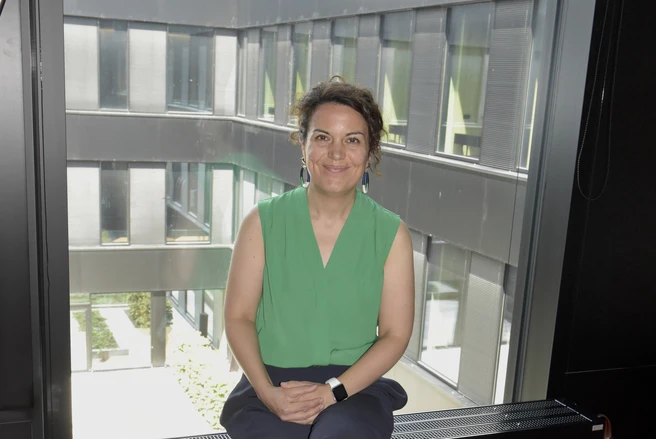Danny Nedialkova, Associate Professor of Biochemistry of Gene Expression, and her team are interested in the fundamental mechanisms that control the timely, accurate, and efficient synthesis (biogenesis) of proteins within cells.
Within human cells, genetic information is stored in DNA. To obtain the proteins necessary for the function of the cell, the DNA is copied (“transcribed”) into a single-stranded messenger RNA molecule. This mRNA is then translated into protein by small protein factories known as ribosomes. These ribosomes have to be assembled on the RNA, much like a rollercoaster cart has to be put on its track. The ribosome carts can only be assembled at specific start sites and may need a push to start the ride. During the ride, the speed of the ribosome cart will vary depending on the slope of the RNA track. Therefore, the moment at which a second cart may be put on the track and start its journey has to be judiciously calculated to avoid collisions. If a collision occurs, the stalled cart must be swiftly removed to avoid further disaster. In the absence of emergency services to quickly remove the wreckage, the rollercoaster will be permanently shut down which, in a cellular context, may lead to disease.
Proteins are generated by the subsequent addition of amino acids to a growing chain. In total there are 20 different amino acids, exactly which amino acid has to be added to a growing protein chain is encoded in the genetic information by so-called codons – stretches of 3 bases that are read together in the DNA, or rather the corresponding mRNA. Human proteins vary in size from only 86 amino acids, as in pro-insulin, to giant molecules, such as titin, a molecular spring in muscle cells made up of 34,000 amino acids. The ribosomal protein factories in cells with a nucleus (eukaryotes) are able to read up to 5 codons (= information for 5 amino acids) per second, yet they still need several minutes to synthesize an average protein, and nearly 2 hours to produce a single molecule of titin. Depending on the cell type or developmental stage of the cell, protein levels may vary greatly. In other words, both the length of rollercoaster ride and the popularity of the ride vary greatly.
The main goal of the Nedialkova lab is to understand how events during the first formative minutes on the ribosome – that is, assembly of the rollercoaster cart, putting it on the rails and pushing off – shape cellular proteomes (total proteins present in the cell) and how dysregulation of these events leads to disease, including neurodevelopmental diseases like microcephaly and intellectual disability.
Geraldine Rodschinka, Nedialkova’s first PhD student at the Max Planck Institute of Biochemistry, set up a system whereby human induced pluripotent stem cells (hiPSC) were either maintained as pluripotent stem cells, or specifically induced to differentiate into neuronal progenitor cells, neurons, or cardiomyocytes (heart cells). These cells have distinct proteomes and global mRNA translation rates, as well as represent lineages selectively vulnerable to protein biogenesis defects in disease. The cells were subsequently engineered using the so-called CRISPR interference (CRISPRi) system, a gene regulation technique whereby the transcription of a specific gene can be silenced in a selective and reversible manner. Her results showed that some genes were universally essential in all cell types tested, whereas others had remarkably cell-type-specific effects (phenotypes). In particular, Rodschinka found that human stem cells, which have a very high global translation rate, critically depend on pathways that detect and rescue slow or stalled ribosomes (our rollercoaster carts). Moreover, she discovered a distinct type of ribosome collision that can occur at or near translation start sites on mRNAs with highly efficient initiation (fast assembly and take off).
The work shows the power of the CRISPRi system for identifying physiological contexts in which different translation factors regulate gene expression and can be applied to study the cell-type-specific regulation of essentially any molecular process in human cells. Nedialkova and her group are looking forward to bringing this expertise to the NAT School upon her imminent move to Garching in the spring of 2026.
Publication
Rodschinka G, Forcelloni S, Kühner FM, Wani S, Riemenschneider H, Edbauer D, Behrens A, Nedialkova DD. Comparative CRISPRi screens reveal a human stem cell dependence on mRNA translation-coupled quality control. Nature Structural & Molecular Biology. doi: 10.1038/s41594-025-01616-3. Epub ahead of print. PMID: 40646310.
Contact about the publication
Prof. Danny Nedialkova
Technical University of Munich
TUM School of Natural Sciences
Associate Professorship of Biochemistry of Gene Expression
danny.nedialkova(at)tum.de
Press Contact
communications(at)nat.tum.de
Team website
